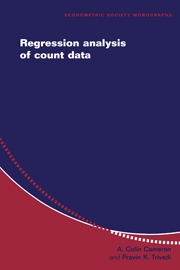Book contents
- Frontmatter
- Contents
- List of Figures
- List of Tables
- Preface
- 1 Introduction
- 2 Model Specification and Estimation
- 3 Basic Count Regression
- 4 Generalized Count Regression
- 5 Model Evaluation and Testing
- 6 Empirical Illustrations
- 7 Time Series Data
- 8 Multivariate Data
- 9 Longitudinal Data
- 10 Measurement Errors
- 11 Nonrandom Samples and Simultaneity
- 12 Flexible Methods for Counts
- Appendices
- References
- Author Index
- Subject Index
- Titles in the series
4 - Generalized Count Regression
Published online by Cambridge University Press: 05 January 2013
- Frontmatter
- Contents
- List of Figures
- List of Tables
- Preface
- 1 Introduction
- 2 Model Specification and Estimation
- 3 Basic Count Regression
- 4 Generalized Count Regression
- 5 Model Evaluation and Testing
- 6 Empirical Illustrations
- 7 Time Series Data
- 8 Multivariate Data
- 9 Longitudinal Data
- 10 Measurement Errors
- 11 Nonrandom Samples and Simultaneity
- 12 Flexible Methods for Counts
- Appendices
- References
- Author Index
- Subject Index
- Titles in the series
Summary
Introduction
This chapter deals with departures from the Poisson regression. One reason for the failure of the Poisson regression is unobserved heterogeneity, which contributes additional randomness. Mixture models obtained by averaging with respect to unobserved heterogeneity generally are not Poisson. A second reason is the failure of the Poisson process assumption and its replacement by a more general stochastic process.
Section 4.2 deals with the negative binomial model. One characterization of this is as a Poisson-gamma mixture. In Section 4.3 we examine the relation between waiting times and counts introduced in Chapter 1. Section 4.4 considers flexible functional forms which are alternatives to the Poisson. Sections 4.5 and 4.6 consider the case in which the range of observed counts is further restricted by either truncation or censoring. Section 4.7 considers an empirically important class of hurdle models that give a special treatment to zero counts. This class combines elements both of truncation and mixtures. Section 4.8 provides a detailed treatment of the finite mixture latent class model that is empirically implemented in Chapter 6. Section 4.9 gives an introduction to estimation by simulation. In the remainder of this section we summarize the motivation underlying the models analyzed in this chapter.
The leading motivation for considering parametric distributions other than the Poisson is that they have the potential to accommodate features of data that are inconsistent with the Poisson assumption.
- Type
- Chapter
- Information
- Regression Analysis of Count Data , pp. 96 - 138Publisher: Cambridge University PressPrint publication year: 1998



